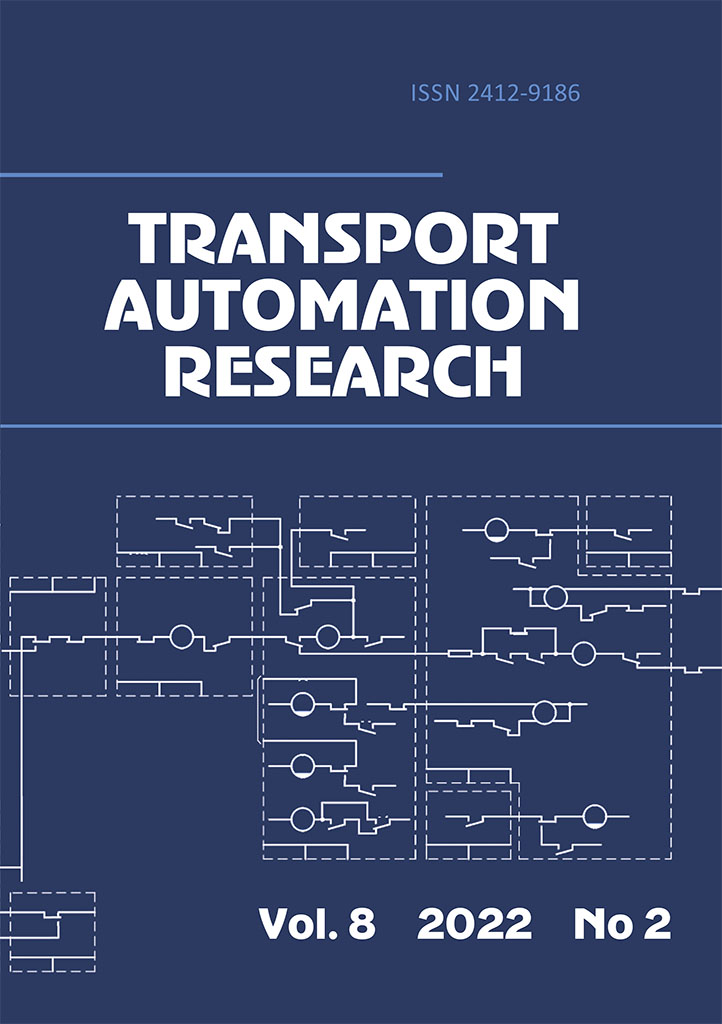Russian Federation
Russian Federation
Russian Federation
The problem of effective development of transportation management methodology for low-density railway lines has important social-economic and industrial value for railway transport network functioning, provision of industry requirements and of population in transportations. The article proposes measure complex on the settlement of theoretical task row, directed on functioning efficiency rise of low-density lines and their transition from lossmaking category to nonlossmaking one as well as the variants of line transmission into profitable ones are worked out. Methodological bases of railway line functioning in the context of transportation management on low-density lines are presented. There is presented the mathematical setting of stable functioning and development of low-density lines. Target function parameters, standards and limitations are established. Integral mechanism of complex assessment of low-density lines is developed which allows to evaluate line work at various stages of functioning and at being embodied managing impacts aimed to traffic intensification. There are worked out the variants of line functioning at interaction of intensive, low-density and being projected lines. Conceptual model of low-density line effective functioning is presented. There is adapted the assessment mechanism for supposed costs and complex planned effect upon embodiment conditions at low-density lines.
transportation process management, railway line specialization, lowdensity lines, integral assessment, railway transport, traffic capacity
1. Kirilenko O.N. Ekonomicheskaya effektivnost' metodov ekspluatacii malodeyatel'nyh liniy // Ekonomika zheleznyh dorog. - 2014. - № 8. - S. 79-85.
2. Vakulenko S.P., Kolin A.V., Evreenova N.Yu. Malodeyatel'nye linii: sostoyanie i varianty optimizacii // Mir transporta. 2017. T. 15. № 3 (70). S. 174-180. doi.org/10.30932/1992-3252-2021-19-4-1.
3. Nikitin A.B., Kushpil' I.V. Vozmozhnost' vnedreniya cifrovoy radiosvyazi i organizacii peredachi dannyh mezhdu stanciyami na malodeyatel'nyh liniyah // Avtomatika na transporte. 2019. T. 5. № 1. S. 45-61. doi:https://doi.org/10.20295/2412-9186-2019-1-45-61.
4. Frumin D. Branching processes of conservative nested Petri nets / D. Frumin, I. A. Lomazova // VPT 2014. Second International Workshop on Verification and Program Transformation Vol. 28: EPiC Series. EasyChair, 2014. - P. 19-35.
5. Chan Y.K., Gaffney P., Neailey K., Ip W.H. The establishment of an integrated management system paradigm for railway engineering management // The TQM Magazine. 1998. T. 10. № 6. S. 420-424.
6. Kovalev K. E., Novichikhin A. V., Ford-Fulkerson algorithm refinement for the cooperation effectiveness increase of intensive and low-density lines // Intelligent Information Technology and Mathematical Modeling 2021 (IITMM 2021) Journal of Physics: Conference Series 2131 (2021) 032008. doi:https://doi.org/10.1088/1742-6596/2131/3/032008.
7. Kovalev K. E., Novichikhin A. V., Interaction of Intensive and Low-Density Lines: Management Approach and Models. In: Manakov A., Edigarian A. (eds) International Scientific Siberian Transport Forum TransSiberia - 2021. TransSiberia 2021. Lecture Notes in Networks and Systems, vol 402. Springer, Cham. https://doi.org/10.1007/978-3-030-96380-4_76
8. Kovalev, K.E., Kizlyak, O.P., Galkina, J.E. Automation of Management Functions of Operational Personnel of Railway Stations // International Multi-Conference on Industrial Engineering and Modern Technologies, FarEastCon 2019, № 8933836. doi: 10.1109 / FarEastCon.2019.8933836.
9. Purnell C.J., Frommer G., Chan K., Auch A.A. Development and management of a radon assessment strategy suitable for underground railway tunnelling projects // Radiation Protection Dosimetry. 2004. T. 108. № 4. S. 353. doi:https://doi.org/10.1093/rpd/nch035.
10. Fröhling R.D. Wheel/rail interface management in heavy haul railway operations - applying science and technology // Vehicle System Dynamics. 2007. T. 45. № 7-8. S. 649-677.
11. Ballis A., Dimitriou L. Issues on railway wagon asset management using advanced information systems // Transportation Research Part C: Emerging Technologies. 2010. T. 18. № 5. S. 807-820.
12. Hiraguri S. Train Control System for Secondary Lines Using Radio Communications in Specifi c Area / S. Hiraguri, M. Fukuda, H. Fujita, Y. Ono // Quarterly Report of RTRI. - 2012. - Feb. - Rp. 1-6.
13. Sauer C. Gleisstromkreise - ein veraltetes oder aktuelles Mittel zur Gleisfreimtlding / C. Sauer // Eisenbahningenieuer. - 2014. - 65. - No 7. - S. 25-30.
14. Q. Shen, J. Qiu, G. Liu, and K. Lv. Intermittent fault’s parameter framework and stochastic petri net based formalization model. Eksploatacja i Niezawodnosc-Maintenance and Reliability, 2016, Vol. 18, no. 2. - Pp. 210-217. doi:https://doi.org/10.17531/ein.2016.2.8
15. Kovalev K.E., Novichihin A.V. Kompleksnyy sinergetiko-indikatornyy podhod k upravleniyu processami perevozok na intensivnyh i malodeyatel'nyh liniyah // Avtomatika na transporte. 2021. T. 7. № 2. S. 252-267. doi:https://doi.org/10.20295/2412-9186-2021-7-2-252-267
16. Shorohova A. V., Novichihin A. V. Imitacionnye modeli social'no-ekologicheskoy bezopasnosti gornopromyshlennyh rayonov // Ekonomika i menedzhment sistem upravleniya. - 2016. - № 4. - S. 93-100.
17. Shorohova A. V., Novichihin A. V. Social'no-ekologicheskaya bezopasnost' gornopromyshlennyh rayonov: razrabotka i konkretizaciya organizacionno-tehnologicheskogo mehanizma upravleniya // Ekonomika i menedzhment sistem upravleniya. - 2016. - № 4.1 (22) - S. 194-200.
18. Kul'ba V.V., Kovalevskiy S.S. Upravlenie i kontrol' realizacii social'no-ekonomicheskih programm. - M.: Knizhnyy dom «LIBROKOM», 2009. - 400 s.
19. Novikov D. A. Mehanizmy funkcionirovaniya mnogourovnevyh organizacionnyh sistem. - M.: Fond «Problemy upravleniya», 1999. - 150 s
20. Novikov D. A. Stimulirovanie v organizacionnyh sistemah. - M.: Sinteg, 2003. - 312 s.
21. Novikov D.A. Teoriya upravleniya organizacionnymi sistemami. - M.: MPSI, 2005. - 584 s.










